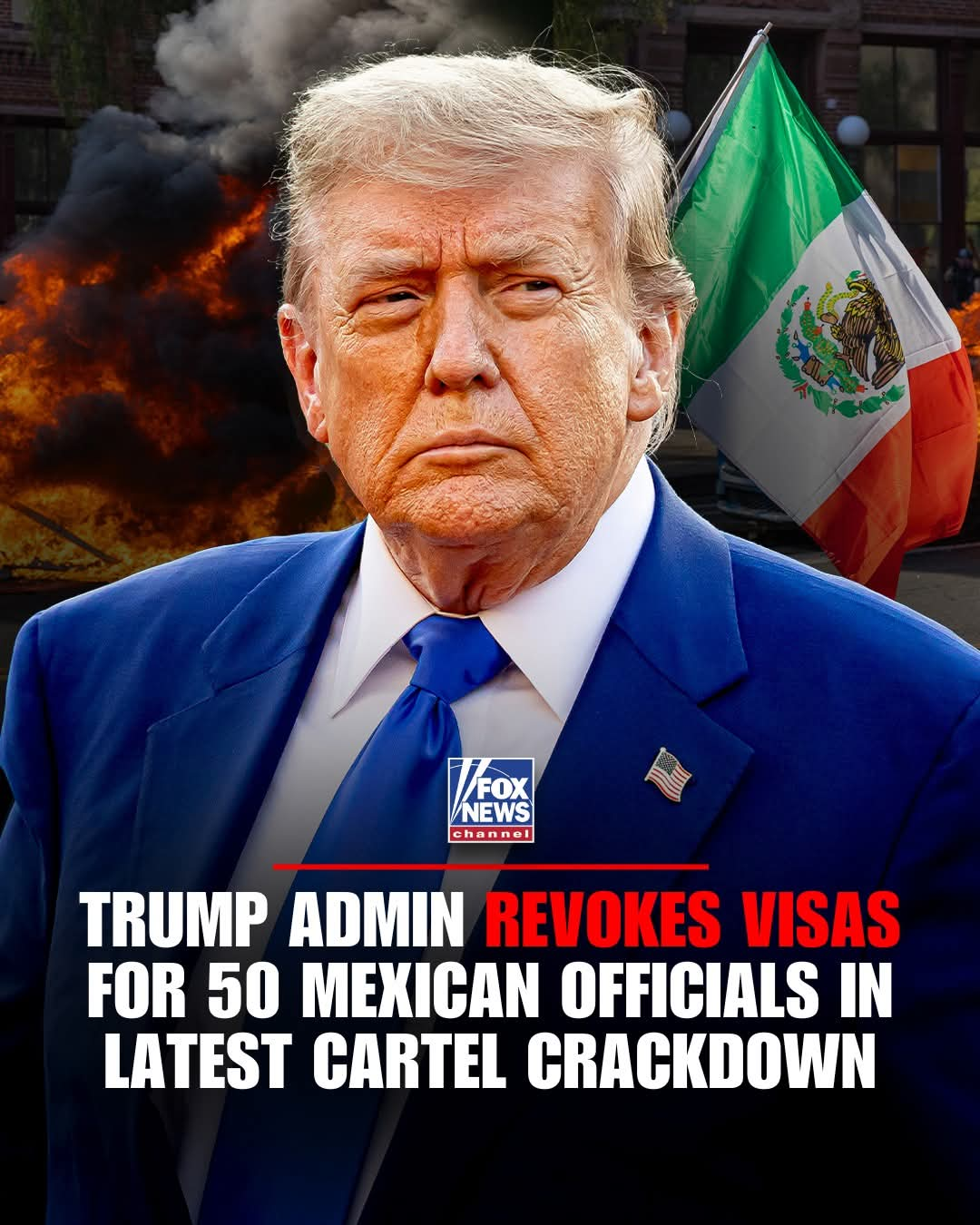CELEBRITY
CARTEL CRACKDOWN: The Trump administration has reportedly revoked visas for at least 50 Mexican politicians and officials tied to drug cartels and their political allies. Most are members of the ruling Morena Party, led by President Sheinbaum, according to two Mexican officials.

Cartel Crackdown: Trump Administration Revokes Visas of Dozens of Mexican Officials
In a sweeping move that marks an escalation of U.S. pressure on Mexico’s political class, the Trump administration has reportedly revoked the visas of at least 50 Mexican politicians and government officials linked whether directly or by suspicion to drug cartels or allies of such networks.
Many of the targeted individuals are said to be affiliated with Morena, Mexico’s ruling party under President Claudia Sheinbaum.
What makes this action particularly notable is its scale and the fact that it involves active office‑holders rather than retired figures or those already convicted.
What We Know So Far
Scope & Public Confirmations
The reported revocations go far beyond the handful of cases publicly acknowledged. Reuters cites unnamed Mexican officials saying that more than 50 politicians from Morena and additional officials from opposition parties have had visas revoked.
Mexico
Among those who have publicly confirmed visa cancellation are:
Marina del Pilar Ávila, Governor of Baja California (Morena)
Juan Francisco Gim, Mayor of Nogales, Sonora (Morena)
Mexico News Daily
Óscar Eduardo Castro Castro, Mayor of Puerto Peñasco, Sonora (Morena)
Mexico News Daily
The U.S. State Department has stated that visa revocations—even for foreign officials—can be carried out at any time for “activities that run contrary to America’s national interest,” without needing to provide explanation.
Change in Diplomatic Strategy
Previous U.S. administrations have revoked visas in targeted cases (for corruption charges, criminal convictions, or serious investigations), but never on this scale or targeting sitting officials so broadly, diplomats say.
Former U.S. ambassadors publicly suggest this is part of a more aggressive and strategic use of visa revocations as a tool of influence over Mexico’s domestic politics.
One senior Mexican source said the move signals that the Trump administration is “finding new ways to exert more pressure on Mexico.”
The principal stated rationale is to weaken the nexus of organized crime and politics. Mexico has long struggled with cartel influence over local governments, law enforcement, and judicial systems. By revoking visas, the U.S. aims to punish or isolate politicians who are perceived to facilitate cartel activity, or at least serve as allies or shields.
Additionally, with the Trump administration classifying certain leading Mexican cartels as “foreign terrorist organizations,” intelligence from U.S. law enforcement agencies like the DEA may increasingly inform visa decisions.
Visa revocations are a relatively low-cost but symbolically powerful diplomatic lever. Unlike formal indictments or sanctions, they do not require as much legal proof, due process, or public justification. The move may be intended to pressure Sheinbaum’s government to take more aggressive anti-cartel stances or to cooperate more closely on U.S. demands pertaining to security, extraditions, or border measures.
Some observers see this as part of Trump’s “America First” agenda, applying pressure on neighboring states to align security policy with U.S. priorities.
Implications & Risks
Backlash and Sovereignty Concerns
Mexican officials have reacted with caution and condemnation. President Sheinbaum’s government has denied having concrete confirmation of the revocations, noting that visa status is personal and confidential information.
Some in Mexico’s political elite view this as a breach of diplomatic norms and a violation of Mexico’s sovereignty especially if revocations are used to influence domestic political outcomes.
Chilling Effect on Political Behavior
Having one’s visa revoked—even without formal charges—carries reputational harm and may deter cooperation with the U.S. or alter political calculations. Politicians may distance themselves from controversial policies or avoid U.S. engagement.
Strain on U.S.–Mexico Cooperation
Collaboration on security, migration, and trade could be jeopardized. If Mexico perceives U.S. actions as heavy‑handed or politically motivated, later cooperation may be withheld or de-emphasized. Some diplomats warn of “blowback,” where Sheinbaum may calculate that collaboration becomes too high a political cost.
Because the U.S. is not required to publicly disclose the reasons or evidence behind a visa revocation, there is potential for abuse, politicization, or accusations without recourse. Without formal charges, affected individuals may find themselves in a state of limbo, unable to contest the decision.
Spotlight: The Ávila Case & Other Known Targets
Perhaps the most visible case is that of Marina del Pilar Ávila, Governor of Baja California, and her husband, Carlos Torres Torres. Both had their U.S. tourist visas revoked earlier in 2025. Ávila has denied any wrongdoing and framed the revocation as an administrative decision, not an accusation.
Opposition parties and critics have used her case to press the ruling party for transparency. However, the Morena leadership and Sheinbaum’s administration have largely defended her.
Other less-publicized names, like municipal mayors in Sonora, have been named in reports, though formal confirmation and evidence remain opaque.
Further revocations or sanctions: Reports suggest the visa revocations may just be the beginning, with dozens more officials on internal U.S. lists.
Legal or diplomatic responses: Affected Mexican officials might challenge the revocations diplomatically, or Mexico might retaliate in kind (e.g. visa bans).
Increased cartel‑opposition conflict: If political pressure increases, cartels may intensify their own strategies: coercion, infiltration, or violence.
Mexico’s strategic choices: Sheinbaum will face difficult choices balancing domestic legitimacy, sovereignty, and cooperation with the U.S.
Transparency demands: Civil society in Mexico will likely push for greater accountability on who is targeted, why, and how decisions are made.
Conclusion
This dramatic visa revocation campaign reveals a sharpened U.S. approach to confronting the entanglement of crime and politics in Mexico. While it signals America’s intolerance for collusion, it also raises deep questions about sovereignty, due process, and the limits of external pressure in shaping domestic politics. Whether this strategy yields genuine accountability or simply fuels tensions will depend heavily on how both Washington and Mexico navigate the backlash.










